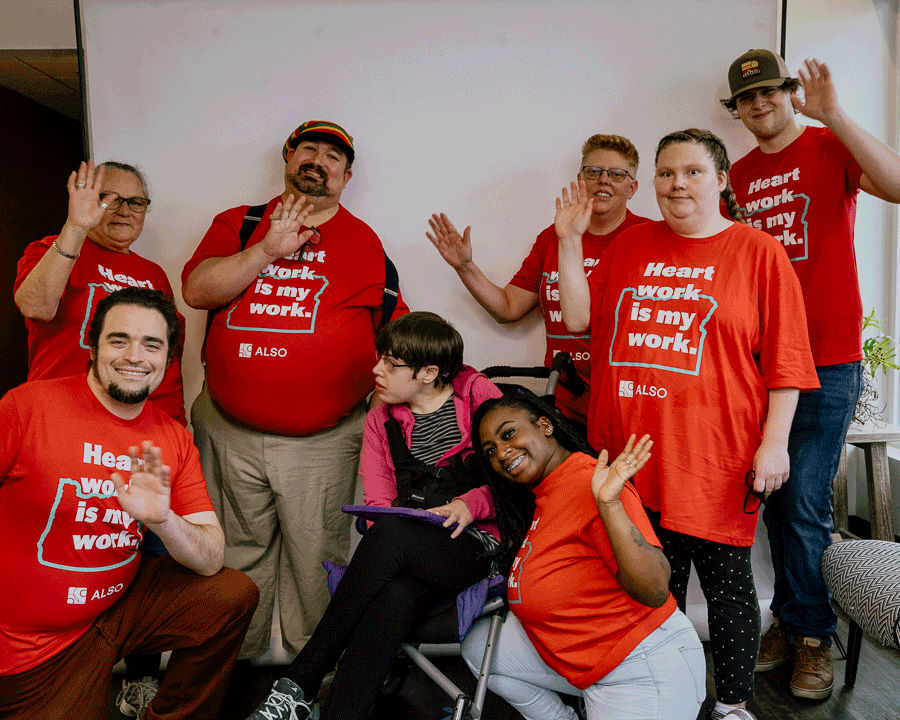Support our diverse communities by buying tickets from the ALSO HEARTS raffle fundraiser! Tickets are available until July 31st, 2025.
Support our diverse communities by buying tickets from the ALSO HEARTS raffle fundraiser! Tickets are available until July 31st, 2025.

Whether a small business or large corporation, companies are finally learning to appreciate the many benefits of diversity and inclusion in the workplace. In addition, potential employees are actively seeking out organizations that have these wonderful attributes deep-rooted in their core values, philosophy, and training initiatives.
The heart workers at ALSO are most honored to answer these common and frequent questions about workplace diversity and inclusion.

Although the terms diversity and inclusion are interrelated, they have some important differences. Diversity is concerned with the representation within an entity. In our case, we are discussing the make-up of employees in the workplace.
Most often, we think of members of a diverse environment as having the following differences:
Over the past several years, thought leaders in the United States and around the world have introduced several other diverse groups into our consciousness. These include and are not limited to the following:
Diversity and Inclusion (D&I) experts have noted that employers are just now starting to explore other types of diversity, such as values, ability, and personality. This is known as deep-level diversity.
Inclusion, on the other hand, is the company culture of wholeheartedly embracing all employees’ differences and valuing them as an asset to the business. The crux of inclusion is about how well the presence and perspectives of those diverse individuals are appreciated and incorporated into the work culture.
A company can have a diverse environment on paper, in press releases, and in training, but still not be inclusive. An example of this is an organization which boasts a high percentage of women, African Americans, and other minority groups. Yet, unfortunately, the management consists entirely of white men.
Similarly, if executives and management don’t value and respect the unique contributions of their employees’ ethnicities, disabilities, and other characteristics, then that work environment isn’t inclusive.

Human resources professionals and business think tanks have studied the concept of D&I extensively. The benefits are quite numerous.
Research conducted by the Harvard Business Review revealed that employees are more innovative and creative when they are allowed to function in diverse environments. This includes the practice of fostering deep-level diversities of personality, values, and ability.
When work teams have the benefit of greater diversity, the ability to learn from one another improves dramatically. Seemingly disparate ideas transform into innovations when employees of different backgrounds can collaborate on projects and assignments.
Employees from diverse backgrounds and different perspectives undoubtedly bring a greater variety of experiences to the table when finding solutions to complex problems. This is particularly the case when work teams have cognitive diversity. Some professionals may refer to this as differences in learning styles, personality types, or work styles.
One of the biggest advantages of a cognitively diverse workplace is that it eliminates group think. This is when everyone on a team approaches problems in the same way, with no originality or ingenuity. It results in employees becoming stagnant and poorly equipped at adapting to change. Cognitive diversity also includes intellectual and/or developmental disabilities such as autism, Down’s syndrome, or cerebral palsy.
Reports have indicated quite a strong connection between an inclusive workplace and employee engagement. When leadership and management make efforts to meet the unique needs and genuinely value the contributions of all employees, workers naturally want to give back and work harder to achieve goals.
When people feel appreciated for their unique perspectives, personal history, and background that they can bring to the organization, they simply want to keep working for that organization and leadership team.
When business leaders embrace D&I initiatives, they are demonstrating to employees that it is indeed possible, no matter what ethnic group, race, religion, or disability a person may have, they can still advance in the organization.
The recent social change that has been occurring in the United States has created a change in attitude when it comes to work. Particularly beginning in 2020, millennials, Gen X, and Gen Z job seekers are considering the presence of an inclusive environment as one of the most important factors in job choice.
Another trend seems to be emerging among Gen Z job seekers. During interviews, they are now making active inquiries regarding the organization’s D&I efforts.
In this era of global companies, diversity and inclusion initiatives are more important than ever. It will take a truly diverse workforce to successfully cater to the global society. The specialized knowledge that diverse employees can contribute in an effort to serve global customers is truly priceless.
One example of this is in the area of goods and services provided by people with disabilities. According to Caroline Casey of Harvard Business Review, over 1 billion people world-wide are living with a disability. This represents a very large part of the market share with a total income of about $8 trillion. It’s getting progressively more important that business leaders learn how to attract this very large part of the global market.

The result of these inclusive workplaces is a competitive advantage in overall business performance and the long-term reputation of the organization. Case in point is a report by the global consulting firm McKinsey and Company. They have documented that ethnically diverse companies are 35% more likely to outperform similar companies that have a more homogenous workforce.
Unconscious bias is when we unknowingly judge a person based on stereotypes. One example of this might be when people assume that someone may be of a certain culture or race due to the sound of their name.
This is an issue that even the most mindful and conscious of us need to keep in check. It’s very likely that having diverse teams in the workplace tends to break down preconceptions and unconscious bias that we might have about our coworkers and community members. The exposure itself is constantly reminding us that everyone has their own special gifts, and everyone is different…thank goodness!
There are several types of unconscious bias, including and not limited to:

So now that we know about the many benefits of D&I in the workplace, it’s time to do everything we can to facilitate diversity initiatives. These strategies will lay a strong foundation for equal opportunity regardless of race, ethnicity, disability, gender identity, or any other difference that an employee may have.
There are several things we can do as employers, employees, and community members:
We at ALSO value diversity and inclusion in the workplace. We must learn to celebrate the differences in how we look, sound, and the unique ways in which we think. As a community, we can truly learn how to help one another and appreciate our differences. Interested in joining our team? Check out our career opportunities here.
ALSO stands for Advocates for Life-Skills and Opportunity. We provide disability support services for people with intellectual or developmental disabilities. We’re dedicated to the people that we serve as well as their families, friends, and other loved ones.
Our Supported Employment services supports people with intellectual and developmental disabilities in finding meaningful employment in their communities. Please contact us if you’re interested in expanding your workplace diversity and inclusion and wish to know how it works.

Sign up for our newsletter to get our latest news, content, and job opportunities.
Help us ensure that everyone has the same opportunities in their home, workplace and community. Let’s make dreams!
